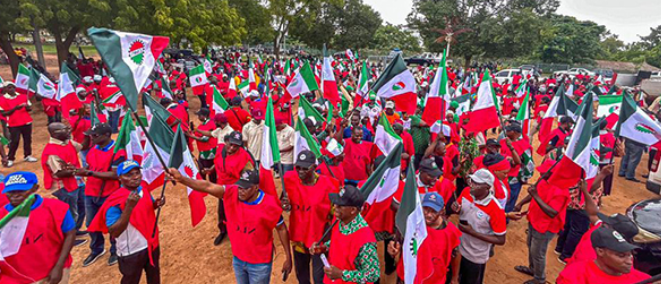The Nigeria Labour Congress (NLC) has clarified the reasons behind the delay in its planned takeover of Labour Party (LP) offices nationwide. This action was initially announced following a Supreme Court judgment last month that raised questions about the legitimacy of certain LP officials, including the party’s chairman, Julius Abure. The NLC, which played a significant role in the formation of the LP, expressed its intention to enforce the court’s decision by taking control of the party’s headquarters and state offices. This declaration led to heightened tensions and accusations of political maneuvering. The delay, however, has prompted speculation and calls for clarification from the NLC.
The NLC’s planned action stemmed from the Supreme Court’s ruling, which recognized a faction led by Lamidi Apapa as the legitimate leadership of the LP. This decision contradicted the existing leadership structure under Julius Abure and raised concerns about the party’s internal governance. The NLC, viewing the court’s judgment as definitive, expressed its resolve to implement the changes by taking over LP offices and installing the Apapa-led faction. This move was met with resistance from the Abure-led faction, which accused the NLC of acting beyond its mandate and interfering in the internal affairs of a political party. The resulting standoff raised questions about the role of the NLC in political processes and the potential implications for the LP’s future.
The delay in the NLC’s planned takeover has been attributed to the Independent National Electoral Commission’s (INEC) ongoing review of the Supreme Court’s judgment. According to Professor Theophilus Ndubuaku, the acting Chairman of the NLC’s Political Commission, the labor organization is awaiting INEC’s official position on the matter before proceeding with its actions. He emphasized the importance of respecting the electoral body’s process and allowing them sufficient time to interpret and implement the court’s decision. This explanation suggests a more cautious approach from the NLC, prioritizing adherence to legal processes over immediate action. The delay also highlights the complex interplay between different institutions in the Nigerian political landscape, where the actions of one body can significantly impact the operations of others.
Ndubuaku refuted claims that the NLC has abandoned its plan to take over the LP offices. He clarified that the delay was purely strategic, pending INEC’s response to the Supreme Court judgment. This statement reinforces the NLC’s commitment to enforcing the court’s decision, albeit within the framework of legal procedures. The NLC maintains that the Supreme Court’s ruling is unambiguous and must be respected. They argue that their intended actions are not aimed at destabilizing the LP, but rather at upholding the rule of law and ensuring the party’s compliance with legal pronouncements. This perspective positions the NLC as a defender of judicial authority, seeking to ensure that court orders are implemented effectively.
The NLC’s stance has been criticized by the Abure-led faction of the LP, which views the planned takeover as an act of political intimidation. The LP has accused the NLC of bias and overstepping its bounds by interfering in the party’s internal affairs. They argue that the NLC’s actions are motivated by political considerations rather than a genuine concern for the rule of law. The LP also questioned the NLC’s understanding of the Supreme Court judgment, suggesting that the labor organization may have misconstrued its implications. This disagreement highlights the deep divisions within the LP and the ongoing power struggle between the Abure and Apapa factions.
The NLC’s delayed action and the ensuing reactions have underscored the complexities of Nigerian politics and the delicate balance between judicial pronouncements, political maneuvering, and institutional roles. The situation raises questions about the extent to which the NLC, traditionally focused on labor issues, should involve itself in the internal affairs of political parties. The delay also highlights the importance of INEC’s role as an impartial arbiter in electoral matters, particularly in navigating and interpreting complex legal decisions. As INEC continues its review, the future of the Labour Party and the outcome of the NLC’s planned action remain uncertain, contributing to the ongoing political tension in Nigeria.


